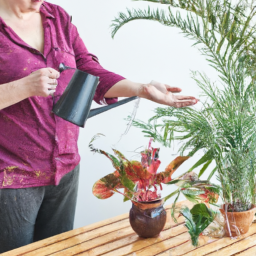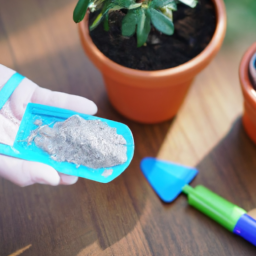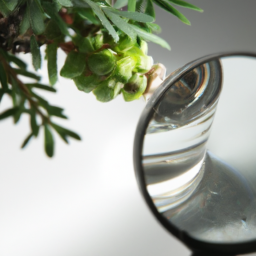
Are you looking for the best water for your plants? Water is essential for the growth and health of plants, but not all water is created equal. In this blog post, we will explore the importance of using the best water for plants to ensure they thrive and reach their full potential. Whether you are a seasoned gardener or just starting out, understanding the role of water in plant care is key to successful gardening. Let’s dive in and discover how to give your plants the best possible hydration they need to flourish.
Benefits of Using Distilled Water for Plant Care
Why Choose Distilled Water?
When it comes to caring for your plants, choosing the right type of water is crucial. While tap water may seem like a convenient option, it can actually harm your plants in the long run. Tap water often contains chemicals such as chlorine and fluoride, which can build up in the soil and disrupt the delicate balance of nutrients that plants need to thrive. This is where distilled water comes in.
Distilled water is free of any impurities or chemicals, making it the ideal choice for plant care. By using distilled water, you can ensure that your plants are getting the purest form of hydration possible. This can lead to healthier, more vibrant plants that are better equipped to withstand environmental stressors.
In addition to being free of harmful chemicals, distilled water also has a neutral pH level, which is beneficial for plants. Many tap waters have a high pH level, which can alter the acidity of the soil and affect nutrient uptake. By using distilled water, you can maintain a consistent pH level in your soil, creating the optimal growing conditions for your plants.
Another benefit of using distilled water for plant care is that it helps prevent the buildup of salts in the soil. Tap water often contains high levels of salts, which can accumulate in the soil over time and hinder plant growth. By using distilled water, you can flush out any excess salts and keep your soil healthy and balanced.
How to Use Distilled Water for Plant Care
When using distilled water for your plants, it’s important to follow a few simple guidelines to ensure optimal results. First, make sure to water your plants with room temperature distilled water. Cold water can shock the roots of your plants, while hot water can damage delicate foliage. By using room temperature water, you can avoid any unnecessary stress on your plants.
It’s also important to water your plants thoroughly with distilled water. Make sure to water until the soil is evenly moist, but not waterlogged. This will ensure that your plants are getting the hydration they need without risking root rot or other issues caused by overwatering.
In addition to regular watering, you can also use distilled water for misting your plants. Misting can help increase humidity levels around your plants, which is especially beneficial for tropical plants or those that require high humidity. Simply fill a spray bottle with distilled water and mist your plants lightly, being careful not to saturate the foliage.
Tips for Using Distilled Water
When using distilled water for plant care, there are a few additional tips to keep in mind. First, make sure to store your distilled water in a clean, airtight container to prevent any contamination. It’s also a good idea to label your water containers to avoid confusion with other household liquids.
Additionally, consider using a watering can with a narrow spout when watering your plants with distilled water. This can help you target the water directly at the base of the plant, reducing the risk of splashing water onto the foliage. This can help prevent the spread of any potential contaminants and keep your plants healthy and happy.
Overall, using distilled water for plant care can have numerous benefits for your plants. By providing them with pure, chemical-free hydration, you can help your plants thrive and flourish. So next time you reach for the watering can, consider using distilled water for the best results.
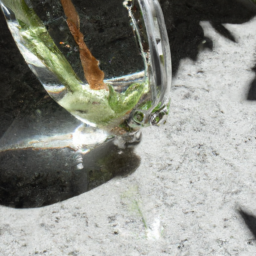
Comparing Tap Water vs. Filtered Water for Plant Growth
Tap Water
Tap water is the most common type of water used for watering plants. It is readily available and convenient to use. However, tap water can contain chemicals such as chlorine and fluoride, which may not be ideal for plant growth. These chemicals can build up in the soil over time and affect the health of your plants. Additionally, tap water may also contain minerals such as calcium and magnesium, which can be beneficial for some plants but harmful for others.
When using tap water for your plants, it is important to consider the quality of your tap water. If your tap water is high in chemicals or minerals, you may want to consider using a water filter to remove these impurities. Alternatively, you can let your tap water sit out for 24 hours before using it to water your plants, as this can help to dissipate some of the chemicals.
Overall, tap water can be used for watering plants, but it is important to be mindful of the quality of your tap water and take steps to ensure that it is suitable for your plants.
Filtered Water
Filtered water is water that has been purified through a filtration system to remove impurities such as chemicals, minerals, and contaminants. Filtered water is often considered to be a healthier option for plants, as it does not contain the same potentially harmful substances found in tap water.
When using filtered water for your plants, you can be confident that you are providing them with clean and pure water that is free from harmful chemicals. This can promote better growth and overall health for your plants. Additionally, filtered water can help to prevent the buildup of minerals in the soil, which can be beneficial for plants that are sensitive to certain minerals.
While filtered water may be a more expensive option compared to tap water, many plant enthusiasts believe that the benefits outweigh the cost. If you are looking to give your plants the best possible care, using filtered water may be worth considering.
Conclusion
When it comes to choosing the best water for your plants, both tap water and filtered water have their pros and cons. Tap water is convenient and readily available, but it may contain chemicals and minerals that can be harmful to your plants. Filtered water, on the other hand, is purified and free from impurities, making it a healthier option for plant growth.
Ultimately, the choice between tap water and filtered water will depend on your individual circumstances and the needs of your plants. If you are concerned about the quality of your tap water or want to provide your plants with the best possible care, using filtered water may be the way to go. Whichever option you choose, remember to monitor the health of your plants and make adjustments as needed to ensure they thrive.
By considering the differences between tap water and filtered water, you can make an informed decision about the best water to use for your plants and help them reach their full potential.
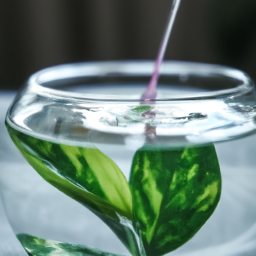
Tips for Choosing the Best Watering Practices for Healthy Plants
Understanding the Importance of Water for Plants
Water is essential for the health and growth of plants. It helps transport nutrients from the soil to the plant’s cells, aids in photosynthesis, and maintains turgidity in plant cells. Without an adequate supply of water, plants can wilt, become stunted, or even die. Therefore, it is crucial to understand the importance of water for plants and how to provide them with the best quality water.
When it comes to watering plants, not all water is created equal. The quality of water you use can have a significant impact on the health and growth of your plants. Here are some tips for choosing the best water for your plants:
Consider the Source of Water
The source of water you use to irrigate your plants can affect their overall health. Tap water is the most common source of water for indoor plants, but it may contain chemicals such as chlorine and fluoride that can be harmful to plants. If possible, use filtered or distilled water to avoid these chemicals. Rainwater is another excellent option for watering plants as it is free of chemicals and rich in nutrients.
Before using any water source for your plants, it is essential to test its pH level. Most plants prefer slightly acidic to neutral pH levels, so make sure the water you use falls within this range. If the water is too acidic or alkaline, you can adjust it by adding pH-balancing solutions.
Another factor to consider when choosing the best water for your plants is its temperature. Cold water can shock plant roots, while hot water can scald them. It is best to use water that is at room temperature to avoid any damage to your plants.
Watering Frequency and Amount
One of the most common mistakes gardeners make is overwatering their plants. While water is essential for plant growth, too much of it can lead to root rot and other water-related problems. To determine the best watering frequency and amount for your plants, consider factors such as the plant’s species, age, and environmental conditions.
As a general rule of thumb, most plants prefer to be watered when the top inch of soil is dry to the touch. Use a moisture meter or your finger to check the soil’s moisture level before watering. Water the plants thoroughly, making sure the water reaches the roots. Avoid watering the foliage as this can lead to fungal diseases.
During the growing season, plants may require more frequent watering, while in the winter months, they may need less water. Adjust your watering schedule accordingly to meet the plants’ needs and prevent water-related issues.
By following these tips for choosing the best watering practices for healthy plants, you can ensure that your plants receive the right amount of water and thrive in their environment. Remember to monitor your plants regularly and make adjustments to your watering routine as needed.
Let’s bring it all home
When it comes to watering your plants, the type of water you use can make a big difference in their overall health and growth. Tap water is a common choice, but it can contain chemicals like chlorine and fluoride that may not be ideal for some plants. If you’re looking for the best water for your plants, consider using filtered or distilled water to avoid any harmful additives. These types of water are free of chemicals and minerals that could potentially harm your plants, allowing them to thrive and grow to their full potential.
Another option to consider is rainwater, which is naturally pure and free of any additives. Collecting rainwater in a barrel or container can be a great way to provide your plants with the best possible hydration. Just be sure to avoid using water that has been treated with softeners or other chemicals, as this can still have a negative impact on your plants. Ultimately, choosing the best water for your plants can make a big difference in their overall health and growth, so it’s worth taking the time to consider your options and choose the best option for your specific plants and garden.
FAQ Compilation:
Q1: What is the best type of water to use for plants?
A1: The best type of water to use for plants is distilled water or rainwater. These types of water are free from chemicals and minerals that can harm your plants.
Q2: Can I use tap water for my plants?
A2: While tap water is safe for most plants, it may contain chemicals like chlorine and fluoride that can be harmful in large quantities. It’s best to let tap water sit out for 24 hours to allow these chemicals to evaporate before using it on your plants.
Q3: Is filtered water good for plants?
A3: Filtered water can be a good option for plants, as it removes harmful chemicals and contaminants. Just make sure the filter is regularly changed to ensure the water remains clean and safe for your plants.
Q4: Can I use bottled water for my plants?
A4: Bottled water can be used for plants, but it can be expensive and not environmentally friendly. If you choose to use bottled water, opt for a brand that is free from added minerals and chemicals.
Q5: How often should I water my plants with the best water?
A5: The frequency of watering your plants will depend on the type of plant and its specific needs. Generally, it’s best to water plants when the top inch of soil is dry to the touch. Monitor your plants closely to determine the best watering schedule for them.

James Wong is a renowned ethnobotanist, plant scientist, and local television presenter. With a passion for demystifying plant science, he is known for translating complex botanical concepts into practical advice for everyday plant enthusiasts. James’s expertise spans from traditional gardening to cutting-edge plant technologies, making his insights accessible and informative.

